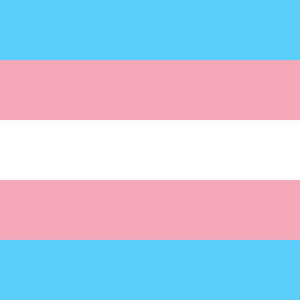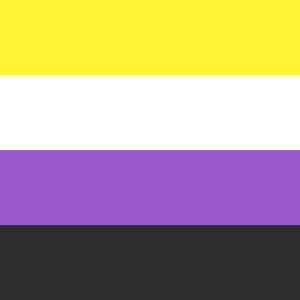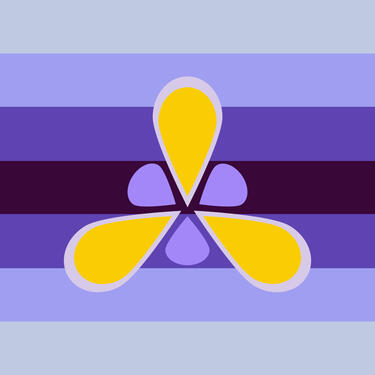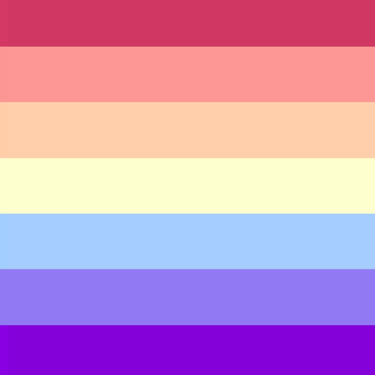let's talk about
xenogenders
What's a xenogender? Why is everything a gender now? Are xenogenders only for ND people? Doesn't this hurt real trans people?
A Carrd with sources.
definitions
Let's start with some context. These are the terms you'll hear mentioned in this Carrd frequently.
Transgender: An umbrella term covering all gender identities or expressions that transgress or transcend society’s rules and concepts of gender. To be trans means to identify as a gender other than the gender one was assigned at birth. The category of transgender includes people who have the binary gender identities of female (transgender women) or male (transgender men). The transgender umbrella includes people with nonbinary gender identities. However, some nonbinary people may not call themselves transgender.
Nonbinary: Any gender identity which does not fit within the binary of male and female. A nonbinary person's gender may include ties to or portions of male or female, but someone counts as nonbinary as long as they're not 100% only of either. Nonbinary people fit under the transgender umbrella.
Pictured: The three most commonly used xenogender flags, and then several lesser known edits of the flags.
Xenogender: A nonbinary gender identity that cannot be contained by human understandings of gender; more concerned with crafting other methods of gender categorization and hierarchy such as those relating to animals, plants, or other creatures/things. It’s mainly an umbrella term for genders with themes such as nouns, archetypes, synesthetic experiences, neurodivergences.The term xenogender was coined in 2014 by Tumblr user Baaphomett in a submission to the MOGAI-Archive blog, and originates from "xeno" (meaning alien). It's an umbrella term for gender labels that are "unusual," genders that are described by relation to animals, plants, or practically anything else, which most of the neolabels also submitted to MOGAI-Archive were. Some examples of xenogenders are autigender, gastrogender, gendernimius, and fictigender. Xenogenders aren't only for ND people, but are often used by those of us whose neurodivergence affects how we perceive ourself and gender.
frequently asked questions
"Are xenogenders serious?"
Usually, yes. People who identify as xenogender do seriously identify as that thing in a gendered way.
But at the same time...
What if they aren't? What does that do? To be fair, being trans/nonbinary doesn't always have to be this imagined experience of constant suffering. We're allowed to describe our lived experience of gender in flowery ways. How many times have you heard male/female defined in silly, non-serious ways? It's okay for someone to loosely identify, use multiple similar labels, etc.
"Do people actually identify this way?"
Yes!
Personally: The author of this Carrd does, and so do many of the people I know
Statistically: The best figure of just how many people out there identify as xenogender is found in Cassian's Gender Census. Some details of past censuses can be found on nonbinary.org's page for xenogender; For example, it notes that in 2019, 3 people entered aesthetigender. Xenogenders are no doubt an uncommon identity, but this doesn't discount those who genuinely identify this way - They deserve respect and recognition.The previous author spent some time converting the full results in the 2020 Census, taking every manually entered response that was a xenogender and adding those up. You can read those details in full here.
➜ "Is this doing damage to REAL trans people?"
Short answer: No, because xenogender people are trans too.If you're asking this question, I want to ask one in return - What are you defining as a "real" trans person?
In your opinion, is someone only really trans/nonbinary if they have gender dysphoria and/or transition to a male/female goal? Xenogenders, for the record, say nothing about one's dysphoria, but The World Medical Association, The World Health Organization, The American Psychological Association, and many other sources agree that not all transgender people suffer from dysphoria, therefore it, and transitioning, are not a requirement for being trans.Is someone only really trans/nonbinary if they can pass? What about trans/nonbinary people who physically can never pass because of how their body is, or because they physically cannot bind/tuck, undergo hormone therapy, or have surgeries because of health conditions?In your opinion, is someone only really trans/nonbinary if how they describe/relate to their gender can "make sense"? To some cis people, just being binary trans (trans female/trans male) doesn't make any sense at all. To some cis people, being nonbinary at all doesn't make any sense.
Etc.It is important to understand that what one might think of when they think "real trans person" might be rooted in excluding a majority of the trans population.
The examples given above don't inherently have to do with what labels someone uses, but are often used (online) as reasons to discount the trans experience of many people. As if not being able to transition, bind, or not feeling dysphoria the same way other trans people do, are all things that prove that person isn't 'really' trans.In addition, I would like to add that I, the author of this Carrd, am an "official" "real" trans person. I'm officially diagnosed with gender dysphoria and recognized as transgender. I don't feel threatened whatsoever by ""weird"" genders, neopronouns, or nounself pronouns, etc, because I understand that this is just someone else's lived experience, and I think it's pretty cool that LGBTQ+ folk have continued to eschew the boundaries of language to invent new ways to refer to ourselves.
"Why identify this way?"
The following list of examples is used with permission:
Many people feel that they can describe their gender with nouns or other descriptors other than typical gender terms (male/female, masculine/feminine, neutral/nonbinary, etc). In the way that a nonbinary person may feel male-aligned or feminine-aligned, a nonbinary person could feel that the way they experience gender is more aligned with, say, an animal or a planet. They’re more easily able to explain the way their gender feels through an object, creature, archetype, etc. than through typical gender descriptors.
Someone may find it euphoric or easy to evoke something visual, aural, etc. as an explanation for their gender rather than trying to explain their more complex gendered feelings or fit into typical gender categories.
Neurodivergency can affect how one perceives gender in a variety of ways. maybe a synesthete has some sort of sensory experience related to their gender, or an autistic person can’t fit into typical gender categories because those categories make no sense to them, etc.
Those who are otherkin, therian, otherhearted, or otherwise alterhuman may relate far more to their alterhuman identities in terms of gender - For example, a cat therian may identify more with a catlike gender, or an alienkin person may feel that their gender would be better understood on another planet.
Xenogender labels are also used by many genderfuck/genderpunk/etc people who want to eschew typical notions of gender.
Gender is a human concept, and many of us just interpret gender in very different ways!
"Are xenogenders only for neurodivergent people?"
No. They're just not. Anyone can be xenogender. It's not something that's dependent on you being neurodivergent or not.
counterarguments
"[Anything that uses "MOGAIs" or "MOGAI genders"]"
MOGAI does not refer specifically to any kind of political stance or kind of gender - The phrase "MOGAI genders" has no real meaning because of the definition of MOGAI itself; Marginalized Orientations, Gender Alignments, Intersex. "MOGAI genders" would literally mean all nonbinary genders, and the same goes for "MOGAIs". When you talk about how you hate ""the MOGAIs"", you're literally just saying "I hate marginalized orientations, genders, and intersex." You're absolutely allowed to have criticism, but these phrasings ignore the fact that MOGAI is an acronym and just come out similar to saying "the LGBTs." Please think about how you phrase things.
"Neolabels/xenogenders/'MOGAI genders' are why people don't take us seriously!"
This is victim-blaming. Trying to blame other people who're trying to find terms to describe their gender/orientation/etc is a slippery slope, and trying to guilt people back into the closet to appease cishet people is never going to work. We do not exist to be palatable to them. This line of thinking is extremely dangerous, and it's been applied to every other identity.
"Autigender? You're making us all look stupid!" - >
"Agender? You can't not have a gender, you're making us all look stupid!" - >
"Transgender? No, you were assigned male/female at birth! You're making us all look stupid!"
Etc... Gatekeeping is the act of attacking the perceived "weakest link," and very quickly, that could be your identity. Unconventional trans and nonbinary people aren’t why transphobia exists, ignorance and bigotry is why transphobia exists. As a community, we need to stand together against transphobia and it's actual cause: Transphobes.Transphobia is not the fault of trans people, and it never will be.
➜ Suggested reading: Transmedicalism & me by mangolence
"These are all made up!"
Yes. So are all words and languages. Words are all made up and all of them are new at some point. Language is not static and any given word has to have a beginning somewhere. The dialect you speak and the words you use are highly dependent on where you live and grow up, when you live and grow up, and the people around you."Heterosexual," "homosexual," and "bisexual" were coined in 1892. "Robot" was coined in 1920. "Transsexual" was coined in 1923. "Transgender" was coined in 1965. "Internet" was coined in the 1970s. "Emoji" and "Gender( )queer" were coined in the 1990s. "Podcast" was coined around 2004. "Crowdfund(ing)" was coined around 2006. Are these words just made up and not real? Do they refer to real concepts and ideas?
"You're not a cat or whatever, you have a human body!"
Xenogenders don't require you to identify as nonhuman. An xenogender person doesn't necessarily identify as nonhuman in any way. Saying one's gender has a relation to [insert thing here] is not the same as making claims about their body.
It's understandable how it can be confusing, especially if you've never thought about feeling gender outside of a male/female/neutral concept - But go back and read the definitions provided. Being xenogender is about feeling those things in a gendered fashion.
"Okay, but gender is still biological!"
No, actually! Gender has nothing to do with your anatomy, genetic makeup, hormonal makeup, or brain structure. It has little relation to the concept of sex (which is not binary either). You cannot determine someone's gender by dissecting them, and you can't tell what someone's sex is by looking at them. You can't tell what chromosomes they have, what their hormones are like, or what anatomy they may have had in the past. Inspecting their skeleton is not reliable either and archaeologists generally rely on grave goods (and even then they can get it wrong.) You can't tell what's in their head without asking them -- any difference between "male" and "female" brains is due to body size. In fact, I'd like to invite you to question what exactly "male" and "female" mean. What's it based on? Organs, external genitals, chromosomes, hormones, skeletons... None of these things inherently mean the other things are all the same.
Sound like a lot? It absolutely is. This is a huge topic, which should be researched on your own if you're interested. This tag on the genderheaven blog may be a good introduction. Follow the links to off-Tumblr resources and do some of your own research for a more in-depth understanding.
"Nearly everyone in middle school biology learned that if you’ve got XX chromosomes, you’re a female; if you’ve got XY, you’re a male. This tired simplification is great for teaching the importance of chromosomes but betrays the true nature of biological sex. The popular belief that your sex arises only from your chromosomal makeup is wrong. The truth is, your biological sex isn’t carved in stone, but a living system with the potential for change.
Why? Because biological sex is far more complicated than XX or XY (or XXY, or just X). XX individuals could present with male gonads. XY individuals can have ovaries.
How? Through a set of complex genetic signals that, in the course of a human’s development, begins with a small group of cells called the bipotential primordium and a gene called SRY.
[..]
...A half century of empirical research has repeatedly challenged the idea that brain biology is simply XY = male brain or XX = female brain. In other words, there is no such thing as “the male brain” or “the female brain".
-- Stop Using Phony Science to Justify Transphobia, 2019.
"Sex is a collection of traits that, while generally dimorphic, can vary greatly in the population, and some can change over time. While the terms “male” and “female” have some utility, we should not view them as strictly dichotomous or mutually exclusive. Rather, “female” and “male” are best thought of as umbrella terms that describe groupings of people (or animals) who generally share many of the same traits, albeit with considerable variability and some exceptions.
-- Transgender People & Biological Sex Myths, Julia Serano, 2017. (Includes more sources)
"There are no genetic tests that can unambiguously determine gender, or even sex..."
-- A statement validating the existence of transgender people
signed by 2617 scientists, a majority of them from natural sciences like biology, neuroscience, biological anthropology, biochemistry, genetics and psychiatry.
The concept of the gender binary as we understand it today is heavily influenced by colonialism, racism, and perisexism. Gender is a social construct mainly identified and expressed by appearance, social, and language choices. The way gender is perceived by society is rooted in white, abled, cisgender, and allo-heterosexual standards, making it so that an additional factor of gender perception is race and orientation. Straight white cis women are the standard for femininity, and straight white cis men are the standard for masculinity. For many years before colonialism, the gender binary was not established in many cultures. For example (source):
In Mesopotamian mythology, among the earliest written records of humanity, there are references to types of people who are not men and not women. In a Sumerian creation myth found on a stone tablet from the second millennium BC, the goddess Ninmah fashions a being “with no male organ and no female organ,” for whom Enki finds a position in society: “to stand before the king.”
In Babylonia, Sumer and Assyria, certain types of individuals who performed religious duties in the service of Inanna/Ishtar have been described as a third gender.
Inscribed pottery shards from the Middle Kingdom of Egypt (2000–1800 BCE), found near ancient Thebes (now Luxor, Egypt), list three human genders: tai (male), sḫt (“sekhet”) and hmt (female).
The Vedas (c. 1500 BC–500 BC) describe individuals as belonging to one of three categories, according to one’s nature or prakrti. These are also spelled out in the Kama Sutra (c. 4th century AD) and elsewhere as pums-prakrti (male-nature), stri-prakrti (female-nature), and tritiya-prakrti (third-nature).
The ancient Maya civilization may have recognised a third gender, according to historian Matthew Looper. Looper notes the androgynous Maize Deity and masculine Moon goddess of Maya mythology, and iconography and inscriptions where rulers embody or impersonate these deities. He suggests that the third gender could also include two-spirit individuals with special roles such as healers or diviners.
(An aside: "two-spirit" is a broad term which refers to a number of different things from different cultures that were homogenized from colonialism and genocide.)
Anthropologist Rosemary Joyce agrees, writing that “gender was a fluid potential, not a fixed category, before the Spaniards came to Mesoamerica. Childhood training and ritual shaped, but did not set, adult gender, which could encompass third genders and alternative sexualities as well as “male” and “female.” At the height of the Classic period, Maya rulers presented themselves as embodying the entire range of gender possibilities, from male through female, by wearing blended costumes and playing male and female roles in state ceremonies.“
Andean Studies scholar Michael Horswell writes that third-gendered ritual attendants to chuqui chinchay, a jaguar deity in Incan mythology, were “vital actors in Andean ceremonies” prior to Spanish colonisation.
In Pakistan, the hijras are officially recognized as third gender by the government.
The biology of trans people does not matter or invalidate their genders, because biology doesn't have a real relation to gender. Assigned sex does not mean anything about your gender. Not even for cis people. Gender as we understand it is rooted in the erasure of nonbinary history. If you're trying to use biology as a "gotcha" against nonbinary genders (including xenogenders), the joke is on you.
good question!
"If gender can be abstract things like this, what even is gender?"
If gender isn't sex, and it's not limited to just being male/female/neutral, then WHAT is it? That's a good question, and I think this might be some people's main issue with xenogenders. It makes them feel afraid that the system they've been going by might not be legitimate, and questioning something you've been raised to believe your entire life is scary - So I can't blame people for feeling confused and scared.
Here's some quotes from both activists and nonbinary people in general:
"After some discussion with a cis friend of mine a few years back, I came to the conclusion that gender is a need.
The same way companionship and food are. Gender is the need to be seen as yourself, specifically what your gender is. For cis people, this need is basically never in danger of getting low. They’re always seen as men or women. But for trans people suddenly it’s really hard to convince people they are who they say, so that need isn’t getting met. That’s kinda part of social dysphoria.
Similarly, you yourself have to see your body as yours, and if you struggle with that, things like body dysphoria happen.
BUT. When your needs are met, or even when they are acknowledged, that can give you a boost of euphoria.“
-- Genderfluid-chameleon
➜ Suggested reading: “Some people visualize gender as a spectrum of colour" by Official-transsexual
➜ How many genders are there?
➜ The qualia argument
Just like art becomes art by being contextualized as art, gender is any number of feelings or experiences that become gender by being contextualized as gender. Art may be “socially constructed” but is still very, very real and value-neutral, and it can be both chaotic and irreverent or of great and significant importance, and gender is like that too.“
-- Wedontcareaboutyourbinary
“…while our shared biology and culture may create certain trends (e.g. a preponderance of typical genders and sexualities), we should also expect the variation in our biology and life experiences to help generate diversity in our genders and sexualities (just as there is a great deal of diversity in our bodies, personalities, interests, and abilities more generally).”
“…all human behaviors, including those associated with sex, gender, and sexuality, are complex traits—that is, they arise through an intricate interplay of countless biological, social, and environmental factors. Because there are many different inputs that may influence our sexes, genders, and sexualities, there will always be a wide range of variation in potential outcomes, rather than one or a few discrete outcomes.“
“…one can never truly peel away the biological from the social or environmental…in other words, as a result of our unique environment, experiences, and biological variation, our brains become quite individualized to a certain degree. And it is through our individualized brains that we experience and respond to the world around us. So the notion that one can point to a specific behavior or preference (e.g., some aspect of gender or sexuality) and claim that it stems entirely from biology, or entirely from socialization, is flat our incorrect.”
-- Julia Serano (Quotes found here)
“Sociological explanations, in turn, often fail to recognize that gender beliefs are influenced by individual-level factors. For example, people differ in the extent to which they hold gender identities, or personally identify with a sex category. Although identities often reflect categories of male or female, they also may include alternatives (e.g., intersex, transgender). The specific content of gender identities can include communal or agentic personality attributes, gender-typed interests and occupations, or gendered ways of relating to others. Men and women act in gendered ways as they regulate their behavior in line with a valued gender identity. Thus, people may do gender because it enhances their self-esteem and positive feelings.”
-- Judith Butler, Gender Trouble (1990)
TLDR: Gender is a social construct. And it's one that is very personable and defined by the individual experience.
Xenogenders cannot be 'made up' or 'fake' because all genders are 'made up.'
While xenogenders can be hard to understand at first, it's important to understand that (the majority of) these terms are coined because someone out there was genuinely struggling to find a label that felt fitting, and found that their actual life experience couldn't be described accurately by more common descriptors like "male," "female," "neutral," and that describing their experience by relating it to something else truly helped them. Sometimes this will be things that seem "silly," like media, aesthetics, and other unique things.
You may not understand how [insert something here] can be a gender, and that's okay. Sometimes we as human beings will not be able to completely understand an experience because it's one we will never have, and that doesn't mean that the experience is invalid.
interested in contributing?
If you want to help out, here are some good ways:
Spread this Carrd to places you think might find it helpful!
Contact me if you're interested in translating this Carrd to your language
Contact me if you find a historical example of someone (earnestly or jokingly) describing their gender with abstract concepts (in poems, zines, journals, etc)
Xenogenders are a specific variety of nonbinary gender. If you're not very educated on transgender/nonbinary topics in general, it may be even harder to understand xenogenders.
Parent of trans child artfully debunks ‘tired, illogical’ claim being transgender ‘is a teenage fad’
The complex, divisive history of the word TERF, what it means and why it’s not actually a slur
r/asktransgender Use the search bar first, if you can't find what you need, make a new post







